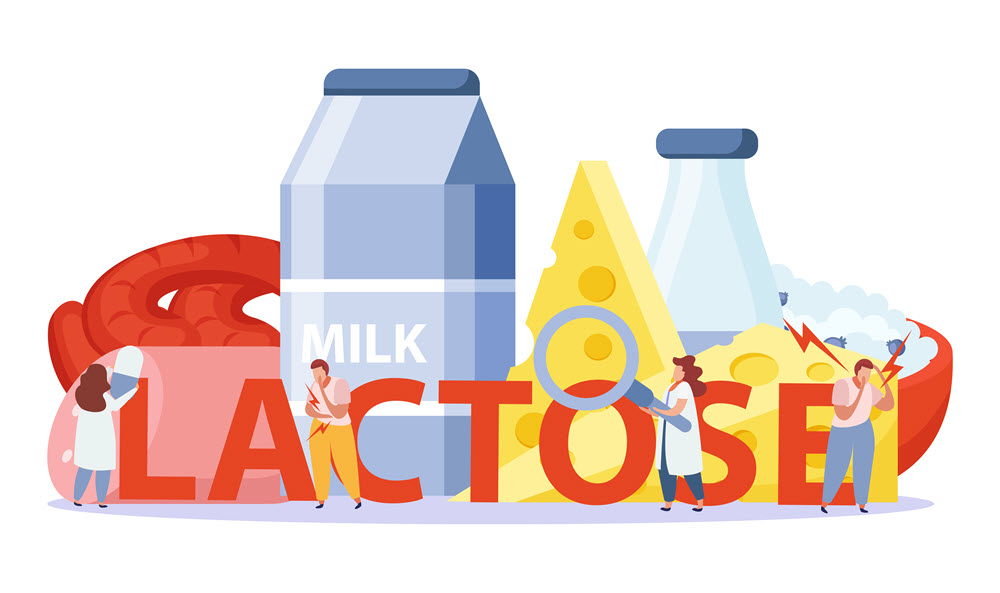Digestive System
Lactose Intolerance
By S.I. (staff writer) , published on November 14, 2021

Medicine Telehealth Health milk indigestion nausea
What is Lactose Intolerance?
Lactose intolerance is a condition in which the milk sugar (lactose) is not properly digested. As an outcome, many people suffer from diarrhea, gas, and constipation when consuming or ingesting dairy foodstuffs. This situation is also known as lactose malabsorption which is not that harmful itself but the consequences could be harmful [1].
What are the Common Sources of Lactose?
Following are the common sources of lactose [2]:
- Milk
- Dairy products
- Other foods and beverages
What are the Symptoms of Lactose Intolerance?
The following are some of the most common signs and symptoms associated with it [3]:
- Constipation
- Nausea
- Vomiting
- Severe abdominal aches
- Gas
- Diarrhea
What Causes Lactose Intolerance?
Lactose is a complex carbohydrate with two sugars: glucose and Galactose. Since it is a large molecule, the body cannot make effective use of it and breaks it down into glucose and Galactose to ensure maximum absorption of the constituents.
Lactose intolerance is caused by low or absent lactase activity, which hinders lactose from being broken down (lactase deficiency) [4].
Types of Lactose Intolerance
Following are the types of lactose intolerance [3]:
- Primary lactose intolerance
- Secondary lactose intolerance
- Congenital or developmental lactose intolerance
What are the Common Risk Factors?
Certain factors put an individual at increased risk for lactose intolerance. Let us have a look:
- Ethnicity
- A disease of the small intestine
- Getting older
- Premature delivery
- Certain cancer treatments
What are the Treatment Options for Lactose Intolerance?
Although lactose intolerance has no cure, most people can alleviate their symptoms by altering their daily diet.
The following medical treatment options can help fight lactose intolerance:
Lactase-based tablets: Lactase enzyme tablets or drops are often used by people who are lactose intolerant. Easily found over the counter, Lactase enzyme medication can greatly aid you with the digestion of dairy products. Alternatively, the droplets may be mixed with milk in a jug.
Probiotics: Probiotics are live bacteria that live in your intestines and help keep your digestive health up to the mark.
Probiotics are mostly prone to treat diseases such as diarrhea and other diseases of this kind. They might aid in the digestion of lactose as well. Probiotics are normally seen to be harmless, so they are worth a shot if other options do not work.
What are some Common Home Remedies?
You may be disappointed with the idea of stopping milk if you are found to be lactose intolerant. However, before you become overwhelmed, here are some simple home remedies you can try to find comfort in.
Living with lactose intolerance does not mean you have to give up milk or all dairy products forever. If lactose intolerance sufferers prepare ahead and take measures, they can consume the things they want.
- Cocoa powder
- Sardines
- Yogurt
When the dairy items are not restricted, many individuals with lactose intolerance may not obtain sufficient vitamin D. To be sure, consult a physician about vitamin D and calcium pills.
References:
- https://pubmed.ncbi.nlm.nih.gov/30335318/
- https://www.ncbi.nlm.nih.gov/books/NBK532285/#:~:text=Lactose%20is%20present%20in%20dairy,referred%20to%20as%20lactose%20malabsorption.
- https://www.ncbi.nlm.nih.gov/books/NBK532285/
- https://www.ncbi.nlm.nih.gov/pmc/articles/PMC6839734/
- https://www.ncbi.nlm.nih.gov/pmc/articles/PMC6316316/
Find articles related to: Medicine Telehealth Health milk indigestion nausea
More articles about Digestive System
Back to the Health Tips Index




